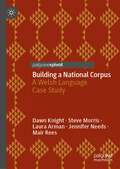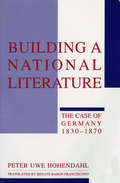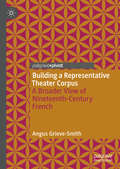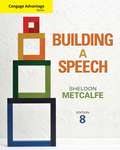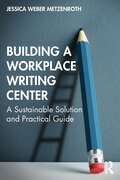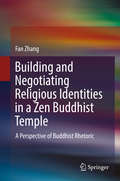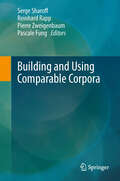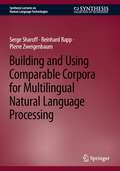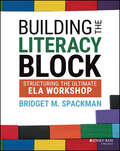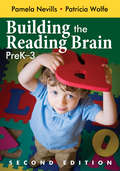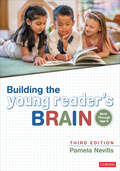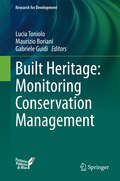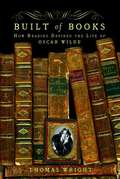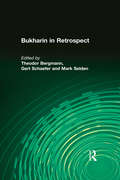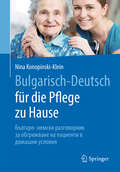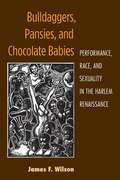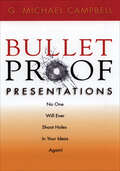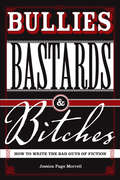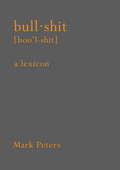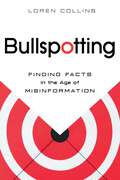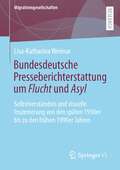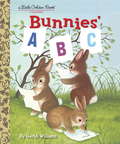- Table View
- List View
Building a National Corpus: A Welsh Language Case Study
by Mair Rees Dawn Knight Steve Morris Laura Arman Jennifer NeedsThis book aims to provide a micro-level, working model of a methodological approach and practical guidelines for building a corpus, informed by the work on the CorCenCC project (Corpws Cenedlaethol Cymraeg Cyfoes - the National Corpus of Contemporary Welsh). It focuses specifically on the development of detailed design frames for corpora across communicative modes (spoken, written and e-language), and the practical processes involved in the planning, collection, transcription, collation and (re)presentation of language data. The book is designed to be of significant value and relevance to those interested in critically engaging with corpus methodology. Although Welsh is the language under discussion, the processes and approaches discussed in the building of CorCenCC can be applied to a lesser or greater extent to other language contexts. This book provides a working model, and an account of how to build a corpus dataset from which step by step guidelines for creating other linguistic corpora in any language can be easily extrapolated. It will be of value to students and scholars of minority languages and corpus linguistics.
Building a National Literature: The Case of Germany, 1830-1870
by Peter Uwe Hohendahl Renate Baron FrancisconoBuilding a National Literature boldly takes issue with traditional literary criticism for its failure to explain how literature as a body is created and shaped by institutional forces. Peter Uwe Hohendahl approaches literary history by focusing on the material and ideological structures that determine the canonical status of writers and works. He examines important elements in the making of a national literature, including the political and literary public sphere, the theory and practice of literary criticism, and the emergence of academic criticism as literary history. Hohendahl considers such key aspects of the process in Germany as the rise of liberalism and nationalism, the delineation of the borders of German literature, the idea of its history, the understanding of its cultural function, and the notion of a canon of major and minor authors.
Building a Representative Theater Corpus: A Broader View of Nineteenth-Century French
by Angus Grieve-SmithThe Digital Parisian Stage Project aims to compile a corpus of plays that are representative of performances in the theaters of Paris through history. This book surveys existing corpora that cover the nineteenth century, lays out the issue of corpus representativeness in detail, and, using a random sample of plays from this period, presents two case studies of language in use in the Napoleonic era. It presents a compelling argument for the compilation and use of representative corpora in linguistic study, and will be of interest to those working in the fields of corpus linguistics, digital humanities, and history of the theater.
Building a Speech (Cengage Advantage Books)
by Sheldon MetcalfeWith 19 chapters organized into five units, BUILDING A SPEECH, 8th EDITION guides students through the step-by-step process of developing public speaking skills through observation, peer criticism, personal experience and instructor guidance. Readings and exercises help students draft informative and persuasive speeches and improves their research and speechwriting skills. Topics such as apprehension and listening help students realize that they are not alone in their struggle to find the confidence to speak in public. BUILDING A SPEECH is grounded in the philosophy that students can master the steps of speech construction when provided with a caring environment, clear direction, and creative examples.
Building a Workplace Writing Center: A Sustainable Solution and Practical Guide
by Jessica Weber MetzenrothThis practical resource provides guidance for writing professionals to sustainably tackle the organizational writing challenges of any professional environment. Rooted in applied experience, Building a Workplace Writing Center guides readers through the process of developing a writing center, from assessing the needs of an organization and pitching the idea of a writing center, to developing a service model and measuring progress. Chapters explore what a writing center can offer, such as one-on-one writing consultations, tailored group workshops, and standardized writing guidance and resources. Although establishing a writing center requires time and a shift in culture up front, it is a rewarding process that produces measurably improved writing, less frustration with the writing and revision processes, and more confident, independent writers. This guide is an invaluable resource for professionals across industries and academia considering how to establish an embedded, sustainable, and cost-effective workplace writing center. It will be of particular interest to business and human resource managers considering how best to improve writing skills within their organizations.
Building and Negotiating Religious Identities in a Zen Buddhist Temple: A Perspective of Buddhist Rhetoric
by Fan ZhangThis book explores the practices in a Zen Buddhist temple located in Northwest Ohio against the backdrop of globalization. Drawing on the previous studies on Buddhist modernization and westernization, it provides a better understanding of the westernization of Buddhism and its adapted practices and rituals in the host culture. Using rhetorical criticism methodology, the author approaches this temple as an embodiment of Buddhist rhetoric with both discursive and non-discursive expressions within the discourses of modernity. By analyzing the rhetorical practices at the temple through abbots’ teaching videos, the temple website, members’ dharma names, and the materiality of the temple space and artifacts, the author discovers how Buddhist rhetoric functions to constitute and negotiate the religious identities of the community members through its various rituals and activities. At the same time, the author examines how the temple’s space and settings facilitate the collective the formation and preservation of the Buddhist identity. Through a nuanced discussion of Buddhist rhetoric, this book illuminates a new rhetorical methodology to understand religious identity construction. Furthermore, it offers deeper insights into the future development of modern Buddhism, which are also applicable to Buddhist practitioners and other major world religions.
Building and Using Comparable Corpora (Theory and Applications of Natural Language Processing)
by Reinhard Rapp Serge Sharoff Pierre Zweigenbaum Pascale FungThe 1990s saw a paradigm change in the use of corpus-driven methods in NLP. In the field of multilingual NLP (such as machine translation and terminology mining) this implied the use of parallel corpora. However, parallel resources are relatively scarce: many more texts are produced daily by native speakers of any given language than translated. This situation resulted in a natural drive towards the use of comparable corpora, i. e. non-parallel texts in the same domain or genre. Nevertheless, this research direction has not produced a single authoritative source suitable for researchers and students coming to the field. The proposed volume provides a reference source, identifying the state of the art in the field as well as future trends. The book is intended for specialists and students in natural language processing, machine translation and computer-assisted translation.
Building and Using Comparable Corpora for Multilingual Natural Language Processing (Synthesis Lectures on Human Language Technologies)
by Reinhard Rapp Serge Sharoff Pierre ZweigenbaumThis book provides a comprehensive overview of methods to build comparable corpora and of their applications, including machine translation, cross-lingual transfer, and various kinds of multilingual natural language processing. The authors begin with a brief history on the topic followed by a comparison to parallel resources and an explanation of why comparable corpora have become more widely used. In particular, they provide the basis for the multilingual capabilities of pre-trained models, such as BERT or GPT. The book then focuses on building comparable corpora, aligning their sentences to create a database of suitable translations, and using these sentence translations to produce dictionaries and term banks. Then, it is explained how comparable corpora can be used to build machine translation engines and to develop a wide variety of multilingual applications.
Building the Literacy Block: Structuring the Ultimate ELA Workshop
by Bridget M. SpackmanTransform the way your students engage with learning during your literacy block. In Building the Literacy Block: Structuring the Ultimate ELA Workshop, veteran public-school educator Bridget Spackman delivers an insightful and practical discussion on establishing an authentic and purposeful workshop model while integrating reading and writing instruction to create a rigorous environment for all learners. Every chapter of the book focuses on an individual element of your literacy block, provides example activities, and offers practical tips on how to accommodate a variety of classroom environments, ages, and learners. Readers will also find: Explorations of the essential elements of establishing a strong literacy block and the process necessary for educators to implement this method of instruction Simple and effective strategies for building critical thinking and lifelong learning skills Techniques rooted in modern instructional practices designed to help educators develop authentic learning experiences for all students. A powerful tool that offers upper elementary teachers methods for establishing an authentic and rigorous literacy block, Building the Literacy Block is a must-have resource for 3-6 literacy educators as well as those who work directly or indirectly with students, teachers, and school administrators.
Building the Reading Brain, PreK-3
by Pamela A. Nevills Patricia A. WolfeDiscover how children’s brains change as they develop early reading skills! Moving through skills acquisition from birth to age eight, this updated edition of the best-selling book gives educators a clear picture of how children acquire and develop language skills in preparation for reading. This updated edition features developmentally appropriate practices for fostering critical literacy skills in each age group and expanded information on English learners and Response to Intervention. The authors provide: Brain-friendly strategies that build phonemic awareness, phonics, vocabulary, comprehension, and fluency skills Instructional applications for games, music, and play Interventions for children with early reading difficulties
Building the Young Reader′s Brain, Birth Through Age 8
by Pamela A. NevillsA practical guide to teaching the way a child’s brain learns best In this update of a bestselling classic, you will learn how to develop children’s capacity and will to read. Each sequential chapter is practical, eye-opening, and exactly what you need to engage young learners, plan lessons, partner with parents, and align your PreK-3 classrooms to the science of learning and the science of reading. Gain the latest insights on: Brain development from birth to age eight, plus the skills to nourish it, age by age and grade by grade What the latest neuroscientific research now says about oral language acquisition The evidence base for practices such as read alouds, inventive spelling, and sustained silent reading Why vocabulary building must happen concurrently with phonological processing, decoding, fluency, spelling, and writing How to artfully combine explicit teaching of skills with playful, multi-sensory routines every day All aspects of memory are needed to develop successful readers. When we engage children’s brains and build our teaching practices around what we know about how the human brain makes meaning, literacy learning makes more sense for children… and for us.
Building the Young Reader′s Brain, Birth Through Age 8
by Pamela A. NevillsA practical guide to teaching the way a child’s brain learns best In this update of a bestselling classic, you will learn how to develop children’s capacity and will to read. Each sequential chapter is practical, eye-opening, and exactly what you need to engage young learners, plan lessons, partner with parents, and align your PreK-3 classrooms to the science of learning and the science of reading. Gain the latest insights on: Brain development from birth to age eight, plus the skills to nourish it, age by age and grade by grade What the latest neuroscientific research now says about oral language acquisition The evidence base for practices such as read alouds, inventive spelling, and sustained silent reading Why vocabulary building must happen concurrently with phonological processing, decoding, fluency, spelling, and writing How to artfully combine explicit teaching of skills with playful, multi-sensory routines every day All aspects of memory are needed to develop successful readers. When we engage children’s brains and build our teaching practices around what we know about how the human brain makes meaning, literacy learning makes more sense for children… and for us.
Built Heritage: Monitoring Conservation Management (Research for Development)
by Lucia Toniolo Maurizio Boriani Gabriele GuidiThis book provides a comprehensive, up-to-date overview on the most pressing issues in the conservation and management of archaeological, architectural, and urban landscapes. Multidisciplinary research is presented on a wide range of built heritage sites, from archaeological ruins and historic centers through to twentieth century and industrial architectural heritage. The role of ICT and new technologies, including those used for digital archiving, surveying, modeling, and monitoring, is extensively discussed, in recognition of their importance for professionals working in the field. Detailed attention is also paid to materials and treatments employed in preventive conservation and management. With contributions from leading experts, including university researchers, professionals, and policy makers, the book will be invaluable for all who seek to understand, and solve, the challenges face d in the protection and enhancement of the built heritage.
Built of Books: How Reading Defined the Life of Oscar Wilde
by Thomas WrightAn entirely new kind of biography, Built of Book explores the mind and personality of Oscar Wilde through his taste in books. This intimate account of Oscar Wilde's life and writings is richer, livelier, and more personal than any book.
Bukharin in Retrospect
by Moshe Lewin Theodor BergmannThis volume is the product of an international conference held in the autumn of 1988, around the time Nikolai Bukharin was officially rehabilitated - a benchmark in the history of glasnost and the process of legitimating perestroika. Conference participants from 19 countries, including the USSR and China, took occasion to reconsider the record and legacy of Bukharin as revolutionary, economist and political theorist. They offer a many-sided but critical re-examination of Bolshevism's "internal alternative" to Stalin and Stalinism.
Bulgarisch-Deutsch für die Pflege zu Hause: Българо- немски разговорник за обгрижване на пациенти в домашни условия
by Nina Konopinski-KleinSprachführer für den PflegealltagDieses übersichtliche Wörterbuch ist ein unverzichtbarer Helfer im Gespräch. Begriffe und einfache Sätze aus dem Alltag werden in beiden Sprachen aufgeführt und erleichtern die Verständigung im Alltag. Einfache Dialoge zu Alltagsthemen wie z. B. Wohlbefinden, Krankheit, Arztbesuch, Haushalt, und Ernährung. Aber auch wichtige Fachbegriffe aus der Pflege werden erläutert. Zahlreiche Abbildungen unterstützen das Gespräch und hilfreiche Vokabellisten erleichtern das Lernen neuer Wörter.Empfehlenswert für bulgarische Pflegekräfte und Haushaltshilfen, die in Deutschland arbeiten; aber auch Senioren und Angehörige finden darin Hilfen zum Gespräch.
Bulldaggers, Pansies, and Chocolate Babies: Performance, Race, and Sexuality in the Harlem Renaissance
by James WilsonBulldaggers, Pansies, and Chocolate Babies shines the spotlight on historically neglected plays and performances that challenged early twentieth-century notions of the stratification of race, gender, class, and sexual orientation. On Broadway stages, in Harlem nightclubs and dance halls, and within private homes sponsoring rent parties, African American performers of the 1920s and early 1930s teased the limits of white middle-class morality. Blues-singing lesbians, popularly known as "bulldaggers," performed bawdy songs; cross-dressing men vied for the top prizes in lavish drag balls; and black and white women flaunted their sexuality in scandalous melodramas and musical revues. Race leaders, preachers, and theater critics spoke out against these performances that threatened to undermine social and political progress, but to no avail: mainstream audiences could not get enough of the riotous entertainment.<P> Many of the plays and performances explored here, central to the cultural debates of their time, had been previously overlooked by theater historians. Among the performances discussed are David Belasco's controversial production of Edward Sheldon and Charles MacArthur's Lulu Belle (1926), with its raucous, libidinous view of Harlem. The title character, as performed by a white woman in blackface, became a symbol of defiance for the gay subculture and was simultaneously held up as a symbol of supposedly immoral black women. African Americans Florence Mills and Ethel Waters, two of the most famous performers of the 1920s, countered the Lulu Belle stereotype in written statements and through parody, thereby reflecting the powerful effect this fictional character had on the popular imagination.<P> Bulldaggers, Pansies, and Chocolate Babies is based on historical archival research including readings of eyewitness accounts, newspaper reports, songs, and playscripts. Employing a cultural studies framework that incorporates queer and critical race theory, it argues against the widely held belief that the stereotypical forms of black, lesbian, and gay show business of the 1920s prohibited the emergence of distinctive new voices. Specialists in American studies, performance studies, African American studies, and gay and lesbian studies will find the book appealing, as will general readers interested in the vivid personalities and performances of the singers and actors introduced in the book.
Bulletproof Presentations
by G. Michael CampbellA step-by-step program that reveals how to speak with confidence in any situation—and advance your career.The ability to make a good presentation, whether it be to peers, bosses, customers, the general public, or the media, plays a major role in your career advancement. This book will give you what you need to speak effectively, with confidence, and in virtually any situation.This step-by-step program can turn even the shakiest speaker into a cool, confident presenter. It gives practical, easy-to-follow guidelines, coupled with the blueprints that will allow anyone apply the techniques immediately. It gives the key to controlling fears, details on how to outline and organize an effective presentation, ways to improve style and delivery, and perfect strategies to captivate any audience. Bulletproof Presentations can help you walk to that podium with confidence and make a presentation that will impress and inform—with the ability to handle even the most difficult questions that may come up.
Bullies Bastards & Bitches: How to Write the Bad Guys of Fiction
by Jessica Page MorrellMorrell is a developmental editor and writer based in Portland, Oregon; she teaches writing workshops throughout the Northwest and is the author of several books about the writing profession. After introductory discussions of primal fears, their place in culture and storytelling, and key considerations in writing complex, believable "bad guy" characters, Morrell explores a variety of character types and situations including unlikely protagonists, anti-heroes, dark heroes and bad boys, bullies and mischief makers, villains, sociopaths, heroes versus villains, dangerous women, monsters, creatures, lost souls, and bad guys for younger readers. Annotation ©2009 Book News, Inc. , Portland, OR (booknews. com)
Bullshit
by Mark PetersAn irreverent lexicon of the seemingly infinite ways we call bullshit, written by a McSweeney's columnist and etymologist, illustrated by a New Yorker-contributing cartoonist.What's the difference between "balderdash" and "drivel"? Where did "mumbo-jumbo" come from? How should you use "meadow mayonnaise"? What's "felgercarb" and which popular TV show coined it? There are hundreds of common and rare terms for bullshit in English, including borrowings from German, turn-of-the-century sailors, The Simpsons, and beyond. Bullshit is everywhere, but not all of it is created equal. Mark Peters's Bullshit: A Lexicon is the handy guide to identifying and calling BS in all of its many forms, from "bunk" and "claptrap" to "applesauce" and "gobbledygook." Packed with historical facts, pop culture tidbits, and definitions for each term, Bullshit is perfect for humor readers, language lovers, and anyone looking to describe life's everyday annoyances.
Bullspotting: Finding Facts in the Age of Misinformation
by Loren CollinsThis entertaining and educational book applies the tools of critical thinking to identify the common features and trends among misinformation campaigns. With illustrations drawn from conspiracy theorists and deniers of every stripe, the author teaches readers how rumors are started, and the rhetorical techniques and logical fallacies often found in misleading or outright false claims. What distinguishes real conspiracies from conspiracy theories, real science from pseudoscience, and actual history from bogus accounts purporting to be history? How does one evaluate the credibility of rumors and quotes or judge the soundness of legal arguments advanced by tax deniers? Readers will learn how to make these critical distinctions and also how to spot "evidence" that has been manufactured or manipulated in some way to create a false impression. At a time when average citizens are bombarded with false information every day, this entertaining book will prove to be not only a great read but also an indispensable resource.
Bundesdeutsche Presseberichterstattung um Flucht und Asyl: Selbstverständnis und visuelle Inszenierung von den späten 1950er bis zu den frühen 1990er Jahren (Migrationsgesellschaften)
by Lisa-Katharina WeimarBilder in der Presseberichterstattung nehmen Einfluss auf die Deutungs- und Wahrnehmungsmuster von Migration. Dadurch sind sie, die Bilder, Teil von gesellschaftlichen Aushandlungsprozessen über Migration. Über Pressebilder versichern sich Gesellschaften ihrer aktuellen Verfasstheit, sodass sie als Teil von Selbstverständigungsprozessen verstanden werden müssen. Aus dieser Perspektive widmet sich die Untersuchung Bildmotiven, die im Zeitraum der späten 1950er bis frühen 1990er Jahre in der Presseberichterstattung über ‚Flucht‘ und ‚Asyl‘ veröffentlicht wurden und leistet so einen Beitrag zum Verständnis der Bundesrepublik als Migrationsgesellschaft in historischer Perspektive.
Bunnies' ABC (Little Golden Book)
by Garth Williams Golden BooksA beloved 1950s Little Golden Book about the alphabet is back in print! This classic Little Golden Book, by the illustrator of Charlotte's Web, is a go-to alphabet book for every child's library! Adorable bunnies scamper and play as they introduce an animal for each letter. From Alligator to Panda to Zebra, Garth Williams' expressive animals come to life for the littlest readers.
Bunny and the Monster (Fountas & Pinnell LLI Green #Level F, Lesson 65)
by Anna MccartFountas and Pinnell Leveled Literacy Intervention Green System -- 1st Grade
